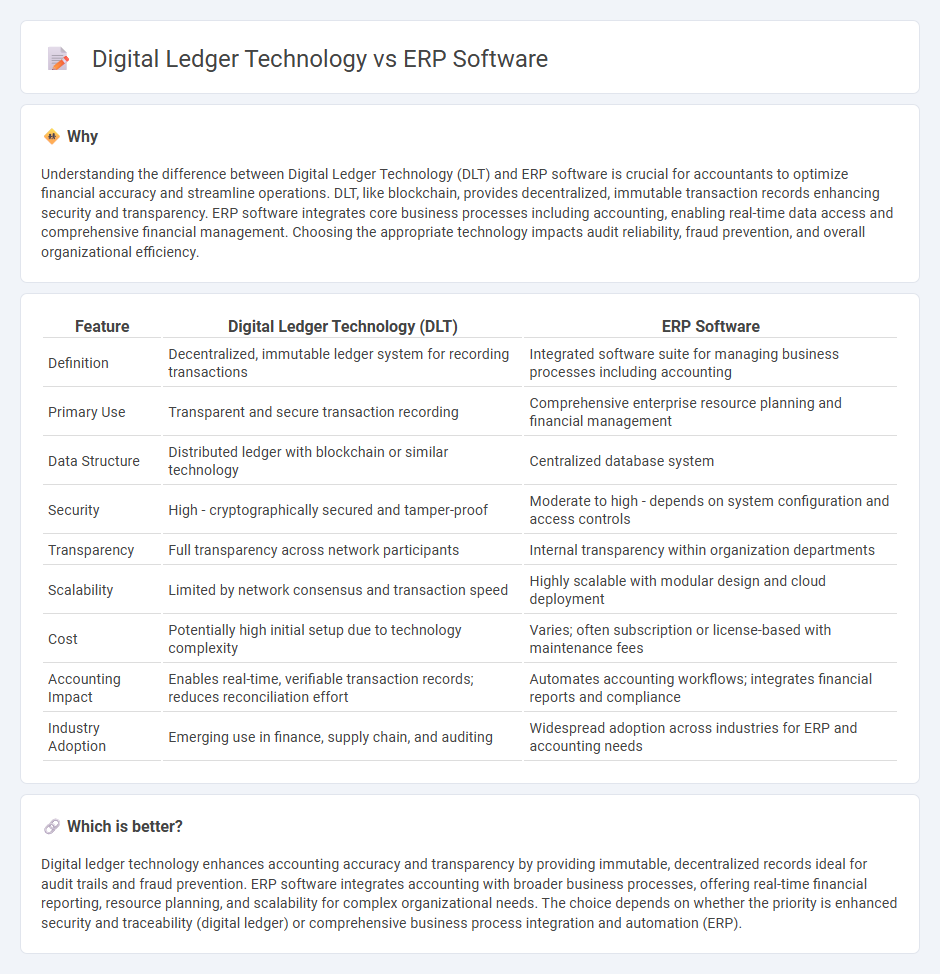
Digital ledger technology (DLT) revolutionizes accounting by enabling secure, transparent, and immutable transaction records, enhancing trust and reducing reconciliation errors. Enterprise Resource Planning (ERP) software integrates core business processes, including accounting, procurement, and supply chain, into a unified system for real-time data insights and operational efficiency. Explore the differences between DLT and ERP software to optimize your accounting strategy.
Why it is important
Understanding the difference between Digital Ledger Technology (DLT) and ERP software is crucial for accountants to optimize financial accuracy and streamline operations. DLT, like blockchain, provides decentralized, immutable transaction records enhancing security and transparency. ERP software integrates core business processes including accounting, enabling real-time data access and comprehensive financial management. Choosing the appropriate technology impacts audit reliability, fraud prevention, and overall organizational efficiency.
Comparison Table
| Feature | Digital Ledger Technology (DLT) | ERP Software |
|---|---|---|
| Definition | Decentralized, immutable ledger system for recording transactions | Integrated software suite for managing business processes including accounting |
| Primary Use | Transparent and secure transaction recording | Comprehensive enterprise resource planning and financial management |
| Data Structure | Distributed ledger with blockchain or similar technology | Centralized database system |
| Security | High - cryptographically secured and tamper-proof | Moderate to high - depends on system configuration and access controls |
| Transparency | Full transparency across network participants | Internal transparency within organization departments |
| Scalability | Limited by network consensus and transaction speed | Highly scalable with modular design and cloud deployment |
| Cost | Potentially high initial setup due to technology complexity | Varies; often subscription or license-based with maintenance fees |
| Accounting Impact | Enables real-time, verifiable transaction records; reduces reconciliation effort | Automates accounting workflows; integrates financial reports and compliance |
| Industry Adoption | Emerging use in finance, supply chain, and auditing | Widespread adoption across industries for ERP and accounting needs |
Which is better?
Digital ledger technology enhances accounting accuracy and transparency by providing immutable, decentralized records ideal for audit trails and fraud prevention. ERP software integrates accounting with broader business processes, offering real-time financial reporting, resource planning, and scalability for complex organizational needs. The choice depends on whether the priority is enhanced security and traceability (digital ledger) or comprehensive business process integration and automation (ERP).
Connection
Digital ledger technology (DLT) enhances Enterprise Resource Planning (ERP) software by providing a secure, transparent, and immutable record of financial transactions. Integrating DLT into ERP systems improves data accuracy, reduces fraud, and streamlines audit processes by enabling real-time transaction verification. This connection supports efficient accounting workflows and strengthens compliance with regulatory standards.
Key Terms
Integration
ERP software centralizes business operations by integrating modules such as finance, inventory, and human resources into a cohesive system to streamline workflows and improve data accuracy. Digital ledger technology (DLT), including blockchain, offers a decentralized, immutable record-keeping solution that enhances transparency and security across multiple stakeholders. Explore how combining ERP systems with DLT can revolutionize integration and enable seamless, secure data sharing across your enterprise.
Automation
ERP software automates core business processes like inventory management, accounting, and human resources, improving operational efficiency through centralized data and real-time analytics. Digital ledger technology (DLT), such as blockchain, automates transaction validation and record-keeping with enhanced security and transparency, enabling decentralized and tamper-proof data sharing. Explore more to understand how automation in ERP and DLT can transform your business operations.
Transparency
ERP software integrates organizational processes, providing centralized data management and real-time visibility to stakeholders, enhancing operational transparency across departments. Digital ledger technology, particularly blockchain, offers immutable, decentralized records that enable traceability and auditability with high security, ensuring transparency in transactions and data sharing. Explore how these technologies transform transparency in business environments and which suits your needs best.
Source and External Links
6 Best ERP Software Evaluated By Experts for 2025 - ERP software integrates and manages core business processes like finance, supply chain, HR, and CRM into a single platform, centralizing data and minimizing manual entries for streamlined operations.
The 8 best ERP software systems in 2025 - SAP S/4HANA is a leading ERP solution known for handling complex business scenarios with advanced real-time analytics, extensive customizability, and both cloud and on-premise deployment options.
Enterprise resource planning - ERP systems provide integrated management of core business processes in real time using shared databases, enhancing efficiency by facilitating accurate transaction flow and cross-department information sharing.
 dowidth.com
dowidth.com